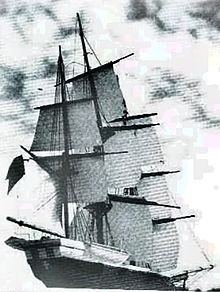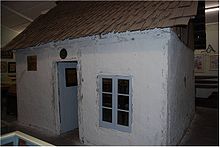Gotthard Daniel Fritzsche
Gotthard Daniel Fritzsche (born July 20, 1797 in Liebenwerda ; † October 26, 1863 in Lobethal , Adelaide Hills ) was a Lutheran clergyman and co-founder of the Evangelical Lutheran Church in Australia .
Life
Gotthard Daniel Fritzsche grew up as the son of a town musician in Liebenwerda. His family was of Evangelical Lutheran faith. He attended the Kreuz-Gymnasium in Dresden and studied in Breslau under Johann Gottfried Scheibel . After completing his studies, Fritzsche worked as a tutor in Breslau. His open appearance against the introduction of the Prussian Union led to his expulsion from the regional church. Fritzsche thus became an active member of the Old Lutheran Church, which was still working underground at the time . Disguised as a journeyman craftsman and migrant worker, he traveled from place to place to promote the goals of his church, to give pastoral support, to baptize and to accompany the dying. He had to proceed cautiously because as a pastor he could be arrested at any time without Prussian permission. After Fritzsche's health deteriorated under these conditions, he decided to move to Hamburg .
There Fritzsche met around 247 members of his old Lutheran congregation who were still looking for money to emigrate to South Australia . From 1840, emigrants from the Old Lutheran Church in Prussia had to have a pastor willing to travel in order to get permission to leave. Gotthard Fritzsche did not intend to emigrate; on the contrary, he had already declined an invitation from Johannes Andreas August Grabau to emigrate to the United States of America . But Fritzsche wanted to help the emigrants. In 1838 his friend Kavel had received money from the Englishman George Fife Angas for the emigration of a group of over two hundred people.
So he traveled to England to meet George Fife Angas, representative of the South Australian Company . Fritzsche tried to raise the cost of leaving the emigrants at £ 1,800 , but Angas was unable to give him that amount. Fritzsche returned to Hamburg without having achieved anything. In June a letter from a Mrs. Richardson in Newcastle reached the group donating £ 270. The main sum of £ 1,124 could be obtained from a woman Nerlich , to whose daughter Fritzsche became engaged in Hamburg.

On July 11, 1841, the group of 213 people emigrated to Australia along with their pastor Fritzsche on the Skjold . 41 of the passengers died of diseases on the ship. The ship arrived in Port Misery near Adelaide on October 28, 1841 .
In 1842 Fritzsche founded the towns of Lobethal in the Adelaide Hills and Bethanien in the Barossa Valley together with the 28 families that remained from the group . Fritzsche moved into his new home in Lobethal with his fiancée Johanna Dorothea Nehrlich (* 1807), whom he married on February 12, 1842.
Gotthard Daniel Fritzsche was a pastor in Lobethal and the surrounding communities. Good relationships with colonists from Prussia who had been resident for a long time quickly developed. In 1842 Pastor August Kavel tried to bring the settlers of the congregations into a large, consolidated congregation. He asked the settlers of Klemzig and Hahndorf to move to the newer municipality of Langmeil . Many settlers rejected this proposal and tension arose between these settlers and Kavel.
Gotthard Fritzsche soon realized that Pastor Kavel adhered to a millenarian belief that he himself rejected. At the synods of the Lutheran Church of Australia in 1844 and 1845, there was therefore an open dispute between Fritzsche and Kavel, including questions of the power of civil government in the church and questions of church doctrine. In addition, Fritzsche's wife died in early 1845, which he could only cope with with great difficulty. The dispute between Kavel and Fritzsche also divided the communities of the settlers. It was therefore agreed that Pastor Kavel should visit the northern areas and Pastor Fritzsche the southern areas.
At the General Synod of the Lutheran Church of Australia in Bethany from 16. – 17. In August 1846 the Lutheran Church of Australia split up:
- Kavel got his own synod, the Evangelical Lutheran Synod in Australia
- and Fritzsche took over the leadership of the Evangelical Church of South Australia .
Fritzsche tried to refute Kavel with the help of writings and counter-writings and to strengthen his church. For example, with the illumination of the protestations contained in the printed synodal announcement of Pastor August Kavel from June 16, against several passages in the symbolic books of the Evangelical Lutheran Church by Gotthard Daniel Fritzsche, Pastor of the Evangelical Lutheran Congregation, to Lobethal and Bethany. by 1847
Despite this separation, the German settlers in Australia were able to build an economically and culturally strong community, whereby the two churches complemented each other.
Gotthard Daniel Fritzsche died on October 22, 1863 in Lobethal.
After the death of his English wife, August Ludwig Christian Kavel married his German housekeeper. Kavel died in Langmeil in 1860.
Later the Lutheran Church continued to fall apart. By 1917 there were six different groups in the Church:
- Evangelical Lutheran Synod in Australia ,
- Evangelical Lutheran Immanuel Synod in Australia ,
- Evangelical Lutheran General Synod of Australia ,
- United German and Scandinavian Synod of Queensland ,
- Australian District of the Ohio Synod ,
- Evangelical Lutheran Church of Australia
In 1966 the reunification of the church took place.
Web links
- Page for German-Australian education (with a photo of Fritzsche's grave) ( Memento from August 10, 2016 in the Internet Archive )
- Entry on Fritzsche at the State Library of South Australia (English)
- D. Van Abbé: Gotthard Daniel Fritzsche . In: Douglas Pike (Ed.): Australian Dictionary of Biography . Melbourne University Press, Carlton (Victoria) 1966–2012 (English).
- Article about Lutheran emigrants from Prussia and Saxony around 1839 by Martin O. Westerhaus (English, PDF)
| personal data | |
|---|---|
| SURNAME | Fritzsche, Gotthard Daniel |
| BRIEF DESCRIPTION | German Lutheran clergyman; Founder of the Evangelical Lutheran Church in Australia |
| DATE OF BIRTH | July 20, 1797 |
| PLACE OF BIRTH | Bad Liebenwerda , Saxony |
| DATE OF DEATH | October 26, 1863 |
| Place of death | Lobethal , South Australia, Australia |



